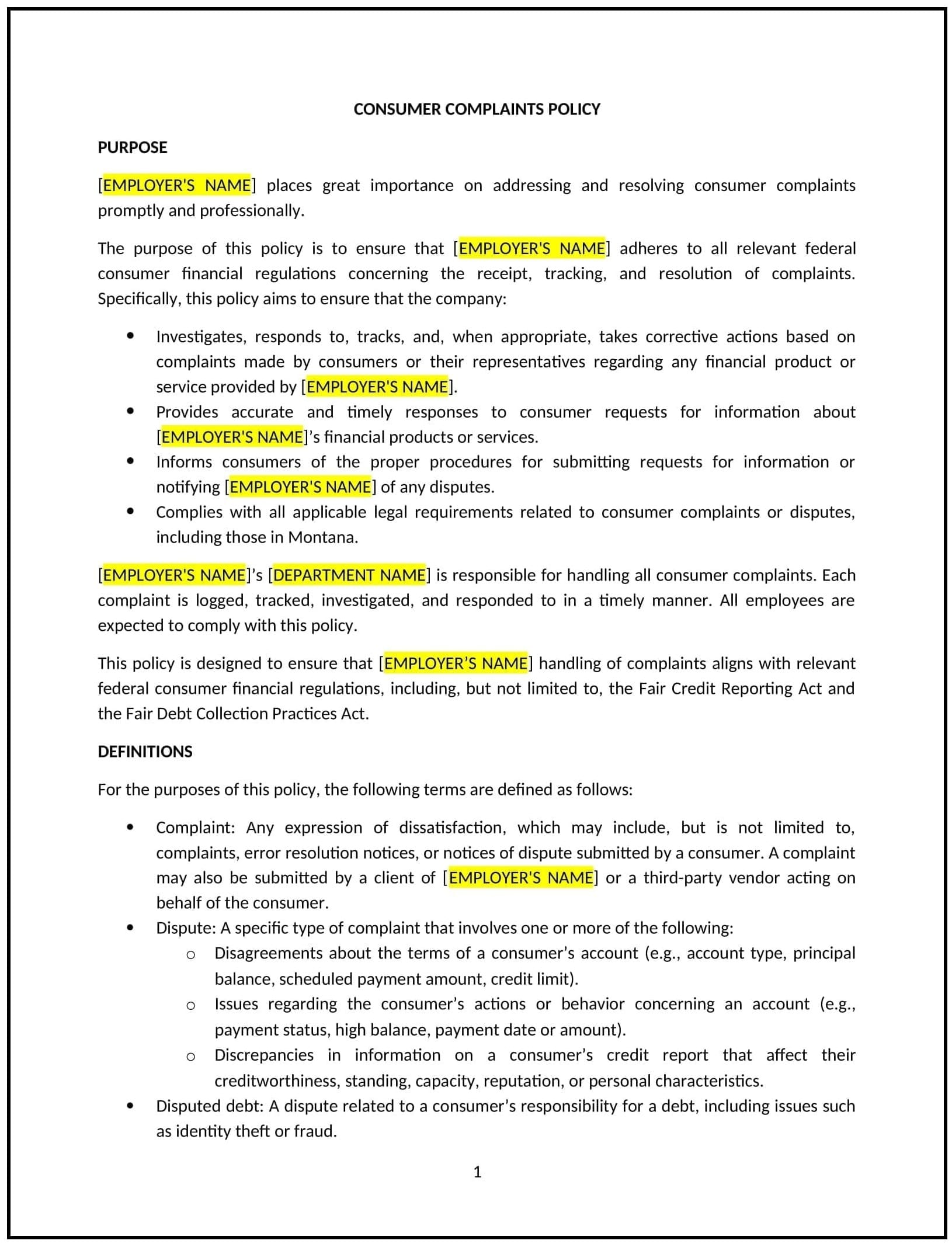Consumer complaints policy (Montana): Free template
Got contracts to review? While you're here for policies, let Cobrief make contract review effortless—start your free review now.

Customize this template for free
Consumer complaints policy (Montana)
A consumer complaints policy helps Montana businesses address and resolve customer concerns in a fair, transparent, and timely manner. This policy outlines how consumers can submit complaints, how businesses should investigate and respond to complaints, and the steps taken to prevent future issues.
By implementing this policy, businesses can improve customer satisfaction, build trust, and protect their reputation by effectively handling consumer complaints.
How to use this consumer complaints policy (Montana)
- Define what constitutes a complaint: Businesses should clearly outline the types of consumer complaints that can be reported, such as product defects, service issues, billing problems, or customer service experiences.
- Establish complaint submission channels: Businesses should provide consumers with multiple ways to submit complaints, such as through email, phone, website forms, or in-person submissions.
- Set timelines for response and resolution: Businesses should specify how quickly they will acknowledge receipt of a complaint and provide a resolution. A reasonable timeframe (e.g., 5-10 business days) should be set for investigating and resolving complaints.
- Outline the investigation process: Businesses should describe how complaints will be investigated, including who will handle the complaint, what steps will be taken to understand the issue, and how findings will be communicated.
- Offer solutions and compensation: Businesses should clarify the types of solutions they can offer, such as refunds, exchanges, repairs, or discounts, and how these will be provided based on the complaint’s nature.
- Maintain records of complaints: Businesses should keep a detailed record of all consumer complaints and resolutions for accountability and quality control purposes.
- Ensure confidentiality: Businesses should protect the privacy of the complainant and any sensitive information disclosed during the complaint process.
- Review and update regularly: Businesses should periodically assess the policy to ensure it remains effective and relevant to customer needs and legal requirements.
Benefits of using this consumer complaints policy (Montana)
This policy provides several key benefits for Montana businesses:
- Improves customer satisfaction: Addressing complaints promptly and fairly enhances the overall customer experience and builds trust.
- Protects the business reputation: By handling complaints effectively, businesses can prevent negative publicity and maintain a positive public image.
- Identifies areas for improvement: Complaints provide valuable feedback that can help businesses improve products, services, and operations.
- Increases customer loyalty: Customers who feel heard and valued are more likely to return and recommend the business to others.
- Promotes legal and regulatory compliance: Properly addressing consumer complaints can reduce the risk of legal disputes and regulatory issues.
- Strengthens internal processes: Businesses that handle complaints effectively often uncover operational or product-related issues that need to be addressed.
Tips for using this consumer complaints policy (Montana)
- Communicate the policy clearly: Businesses should ensure consumers are aware of the complaint process, submission methods, and how their complaints will be handled.
- Train staff on handling complaints: Employees should be trained to handle consumer complaints professionally, empathetically, and effectively.
- Stay responsive and transparent: Businesses should acknowledge complaints quickly and keep consumers informed about the status of their complaints and resolutions.
- Maintain accurate records: Keeping detailed records of complaints and resolutions will help businesses track trends, identify areas for improvement, and ensure accountability.
- Offer clear resolutions: Businesses should provide practical and fair solutions to consumer complaints, whether through refunds, repairs, or other compensatory measures.
- Regularly assess customer feedback: Businesses should monitor complaints and look for patterns that could indicate broader issues that need to be addressed.